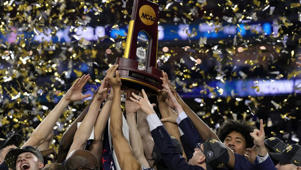
© David J. Phillip, Associated Press Connecticut players celebrate with the trophy after their win against San Diego State in the men’s national championship college basketball game on Monday, April 3, 2023, in Houston.
It ought to be obvious.
If you dance around a swamp too much, you’re going to fall in and get muddy. If you get your kicks jumping over fires, prepare to get burned. If you keep poking a hornet’s nest … well, you get the idea.
We all understand the analogies. So, why do Americans think they can wholeheartedly embrace sports gambling and not see more betting scandals and more lives ruined?
The NCAA released a survey this week that it hopes will establish a “new baseline of sports betting activity,” according to a news release. Among other things, it found that 67% of college students who live on campus place bets on sporting events.
Of all college students, including those who live off campus, 41.2% bet on their school’s team, and 34.7% use a bookmaker who is a fellow student.
You don’t need an on-campus bookmaker in 2023, of course. Nearly 40% of all people 18 to 22, regardless of whether they go to college, have used a mobile app or online sports book, whether it is located inside the U.S. or abroad.
We don’t know how this would compare to the days, not long ago, when sports gambling was illegal and shunned by the NCAA, but you could probably offer an educated guess.
And as for the swamp, the fire, the hornet’s nest or what have you, consider that sports betting services today heavily target college students. Of those who live on campus, 63% could recall seeing ads, which the survey notes is “a higher rate than the general population.”
Related
Broadening things a bit, the survey found that, among all people 18-22, whether students or not, 58% have engaged in sports betting. Of those, 42.4% place bets at least monthly.
Among those who wager, about 28% said they had lost more than $100 at a time, with 2.2% reporting losses greater than $1,000.
In response to all of this, NCAA President Charlie Baker said in a statement, “Sports betting has increased interest in sports of all kinds, including college sports, which is great for our fans, but the NCAA and everyone from coaches to athletics department staff and college presidents must better understand what impact sports betting may have on student-athletes.”
Great for the fans? Student-athletes? What about regular students throwing away their money?
Not too many years ago, grownups were rightly concerned about campus gambling. The interest it might develop in college games was considered insignificant compared to the harm it could do to young people who ought to be learning the skills to survive and prosper as adults, not saddling themselves with unnecessary debts.
Baker should understand this. When he was governor of Massachusetts, he pushed to legalize sports betting, but, “he wanted a prohibition on college sports betting,” according to legalsportsreport.com.
I requested an interview with him, but the NCAA has yet to respond. I want to know what his worries were about college betting and whether he fears those worries are coming true.
He ought to be afraid. The NCAA’s vice president of enforcement, Jon Duncan, told Sports Illustrated last week that its infraction cases regarding sports wagering are “spiking.” Despite signs in locker rooms warning about the criminal implications of student-athletes involving themselves in sports betting, many of them are acting just like their non-athlete college peers. Who knew?
“You can throw a net and get any number of schools,” Duncan told the magazine. “They’re hot right now.”
Sports Illustrated cited three gambling-related cases underway at Alabama, Iowa and Iowa State. Alabama’s baseball coach has been fired, and the other two schools allegedly have multiple athletes suspected of violating gambling rules.
An NCAA dashboard shows 24 infraction cases under preliminary review, with 16 under current investigation.
None has been accused of point shaving or trying to alter the outcomes of games, but my guess is that’s just a matter of time.
I contacted Les Bernal, the national director of the advocacy network Stop Predatory Gambling, who was quick to criticize the NCAA survey.
“Charley Baker saying sports gambling has been great for our fans, actively putting his stamp of approval on this,” he said, “that’s totally out of touch.”
Bernal said the survey is misleading. It concludes that the largest share of wagers are only $10 to $20, when in-game gambling on mobile apps lures people into making several such wagers during the course of each game.
Also, the survey suggests young people gamble at the same rate whether it’s legal in their state or not.
“I think that’s nonsense,” Bernal said. “As if this is a similar problem in Utah, where online gambling isn’t advertised endlessly on campuses.”
The survey’s most troubling outcome may have been the racial inequities it uncovered. For whatever reason, young Black Americans wager more frequently and at higher amounts than their white counterparts.
The nation has a bad case of amnesia when it comes to things like this. College sports have had their share of gambling scandals, including a massive basketball point-shaving scheme that unraveled in the early ’60s.
If people ever begin to suspect a league’s games aren’t on the level, credibility would be hard to regain. Why throw that hornet’s nest into the fire while dancing around the swamp?